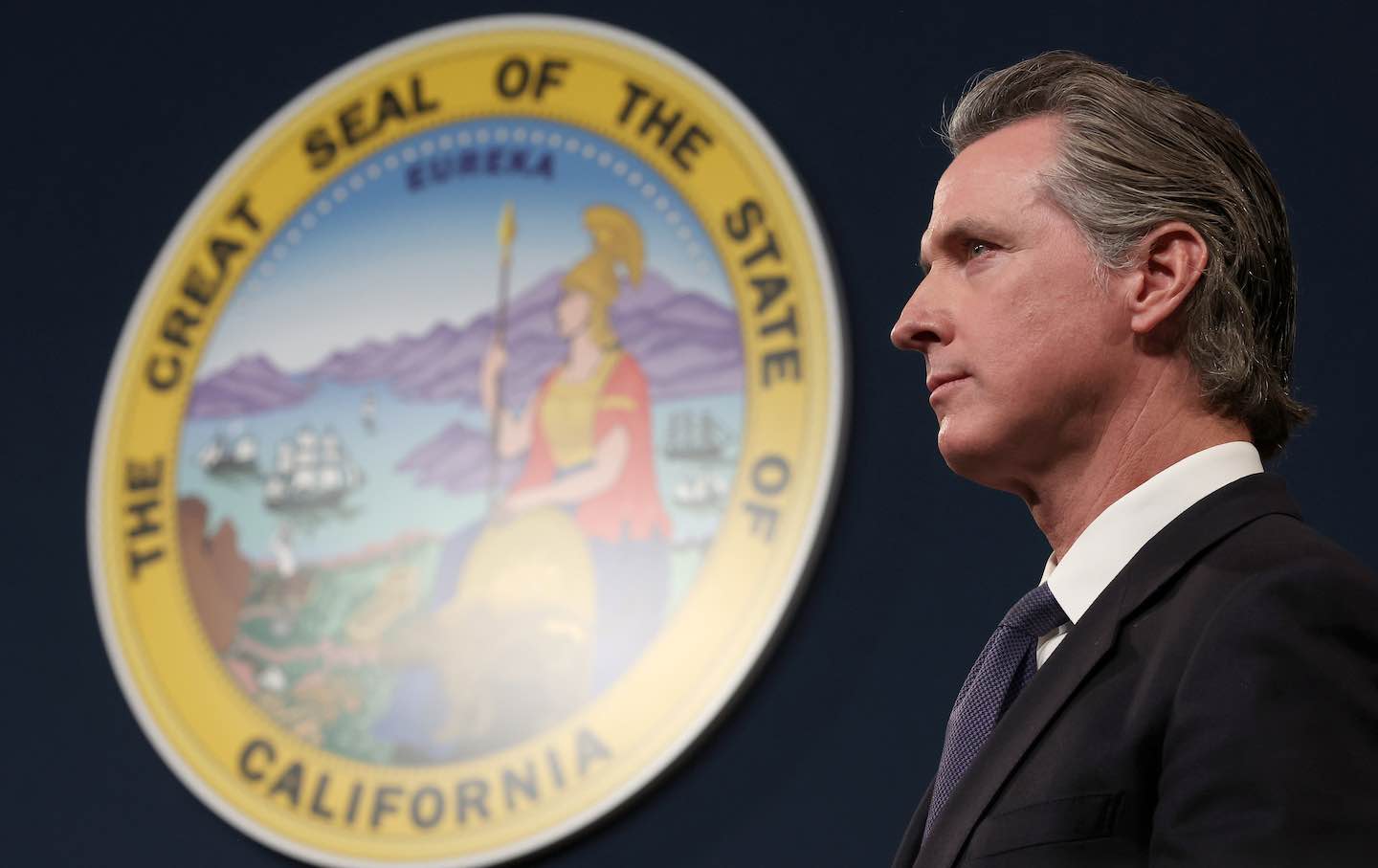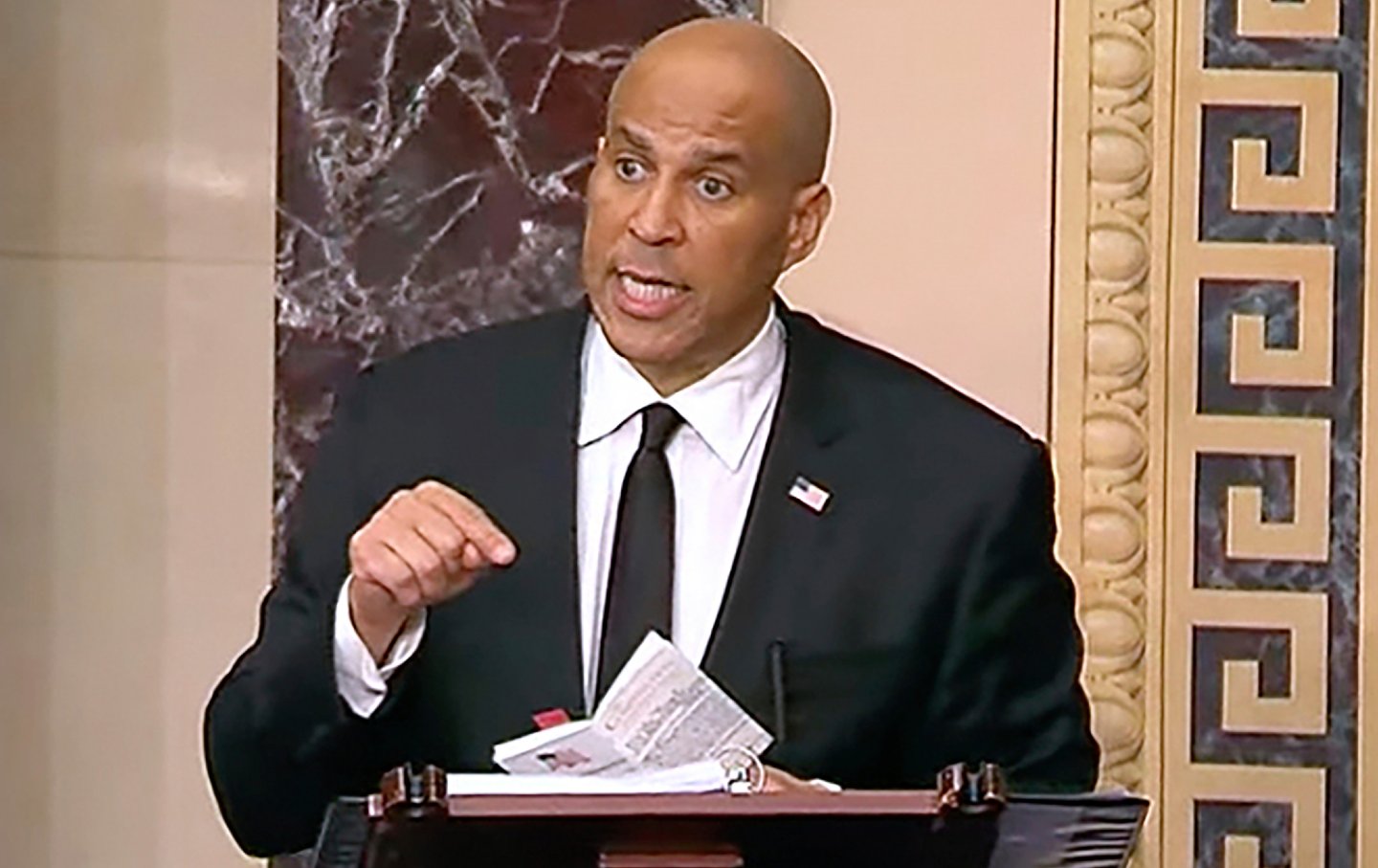The Spending Fiasco Was a Preview of the Trump-Musk Administration
Congress narrowly averted a shutdown, but the whole episode offers a sneak peek of the oligarchy in store.

US Speaker of the House Mike Johnson paces just prior to the House’s approval of a stopgap spending bill.
(Kent Nishimura / Getty)
With minutes to spare ahead of the deadline for a shutdown, the Senate approved the third version of the House’s spending bill last night. This latest installment in the dysfunctional soap opera known as Mike Johnson’s speakership was also the most unhinged, thanks to the obstructionist role played by centibillionaire turned first buddy Elon Musk. As the House prepared to vote on the initial bill to fund the government earlier this week, Musk took to the account he keeps on X, the social media platform he owns and now maintains as a palace for workshopping right-wing agitprop, to declare that any House member supporting the deal should be voted out in the next midterm cycle. (His subsequent flurry of attacks on the deal were a trademark Musk fireworks display of ignorance and lies.) Chaos then ensued: Johnson’s spending package died before a vote could be scheduled, and under the tutelage of Musk and President-elect Trump—who was something of an afterthought in the whole guignol—returned with a deal to shorten the length of the continuing resolution from March to January while also raising the debt ceiling, as a glide path for the legislative agenda of the coming Trump presidency.
That maneuver was also a face-plant, with the House voting it down decisively on Thursday; notably, 38 Republicans joined the Democratic caucus in rejecting it, incensed by the debt limit ploy. In seeking to browbeat congressional Republicans into submission ahead of taking office, the Trump-Musk administration instead provoked a greater uprising of spending hawks aligned with the Freedom Caucus than the Biden White House ever managed to.
The final bill that won passage disaggregated the main spending priorities of the prior two continuing resolutions into three stand-alone bills: the principal government-funding ask, combined with a $110 billion package of hurricane and agricultural relief aid, and a major bill called the farm law, combining anti-poverty and agricultural reform measures. After all the oligarchic sound and fury that overtook the spending negotiations, the end result isn’t all that different than what the House had started with.
The exceptions are quite significant, however. The first spending deal included provisions to curb prescription drug prices and step up oversight of US investment in China. That last item would have been a costly imposition on Musk’s sprawling fortune; his electric car empire, Tesla, derives about a quarter of its revenue from China-based production plants, and he’s already militantly opposed to basic corporate oversight of the company’s stateside operations. Musk’s success in getting the China legislation jettisoned now stands out in high relief against Trump’s failure to engineer a debt-ceiling reprieve. The new administration’s new master of the art of the deal isn’t Trump but the posting-addled, ketamine-fueled, cheerleading dipshit who holds no elected office and should be, on plain conflict-of-interest grounds, the last person on Earth dictating policy to Congress.
Musk’s lead role in the spending fiasco has already sparked a round of speculation about a rift between him and the president-elect, and pundits will likely obsessively monitor the state of Musk-Trump relations once the new administration takes office next month. But the personalities of these two attention-starved hucksters aren’t really the issue—it’s the oligarchic conflict of interest, stupid. That Musk was directing the spending priorities of the legislative branch in a moment of crisis is an abuse of power that would have even shocked the brazenly corrupt political leaders of the first Gilded Age; it would have been like naming John D. Rockefeller chief justice of the Supreme Court. Oligarchic power is also responsible for the other hastily scuttled planks of the spending deal; it will be quite a narrative challenge for future historians to parse out how the government almost ground to a halt to save the sinecures of pharmacy benefit managers who engage in price gouging. (Another healthcare provision rudely defenestrated at Musk’s behest was a $200 million outlay to research and treat pediatric cancer; this Christmas-season act of billionaire predation was too Dickensian even for today’s GOP, and $63 million of the lost funding was restored in a rare unanimous Senate vote on the eve of Congress’s final closing gavel.)
In its broader oligarchic outlines, the spending fiasco is not merely a return to form for a Trumpian model of governance that’s basically indistinguishable from the ethos of organized crime; it’s also a clear preview of the plutocratic squalor that will ensue in a second Trump term unshackled from the restraints of electoral accountability. The other signal Musk win in the whole fracas was the GOP House conference’s agreement to a framework to approve $2.5 trillion in spending cuts in the incoming 119th Congress. That figure is a cut-and-paste adoption of the made-up target for spending cuts that Musk blurted out when he was tapped as cochair of Trump’s similarly jury-rigged Department of Government Efficiency. As the present spending donnybrook vividly demonstrated, it’s quite unlikely that the new House, in which the GOP majority will be even smaller than the one that operated in the past Congress’s razor-thin margin, will muster the votes to advance this projected mauling of the social safety net.
Still, it remains important to flag the brazen oligarchic agenda in play here. The main tributaries of mandatory spending that would come under this Muskian austerity diktat include Medicare, Medicaid—and even Social Security benefits in the fullness of time. (Even though Social Security overhauls are now exempt from the reconciliation process that would likely spur further spending deals, a dedicated legislative branch working under Musk’s de facto direction could find ready workarounds.) Regardless of the rocky course of the Trump-Musk rivalry for power in the long months ahead, the billionaires now throttling the conduct of our governance are in fundamental accord on the main business before them: to ensure that you get shaken down at every pass to continue fattening their bottom lines. Welcome to life under the Department of Government Oligarchy.








